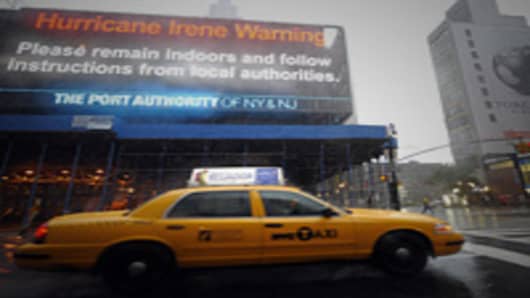Hurricane Irene will take a very small bite out of a U.S. economy already struggling with debt and unemployment after businesses across the East Coast closed their doors ahead of the deadly storm.
For rich nations, catastrophes often appear as mere blips in economic growth charts, with rebuilding efforts making up for output lost to disaster.
That should be the case for the United States this year, with the blip tame because Irene weakened as it marched north and failed to cause as much damage as was feared in New York City.
Still, households won't make up for all the lost spending, nor will they use extra electricity to compensate for widespread power outages.
And for a country struggling with debts amassed during a housing bubble that later popped, buying flashlights, candles and water reduces the money available for other things. Fixing damaged roads could hurt federal coffers already straining to cut unemployment checks.
"The national balance sheet will be damaged," Ian Shepherdson, an economist for High Frequency Economics, wrote in a report about the hurricane.
"It (does not) make any sense to argue that a storm is a positive factor for the economy."
U.S. economic growth sharply weakened early in the year as government spending eased and an earthquake in Japan disrupted supply chains. Most economists expect growth will pick up in the second half of the year.
Irene slammed into North Carolina on Saturday and eventually knocked out electricity for some 3.6 million people in several states. The cyclone killed at least 12 people.
New York City closed its subway system and ordered more than 250,000 to evacuate.
Shuttered Stores
Across the eastern seaboard, many thousands of retailers shut down over the weekend, said Ellen Davis, a spokeswoman for the National Retailer Federation who lives just outside the capital.
Davis went out to eat near the waterfront on Saturday night as winds began to pick up.
"We were the only people in the restaurant and there were a ton of stores that were closed," she said.
High Frequency Economics expects jobless claims will rise sharply next week.
That's unwelcome news for an economy already hampered by a high unemployment rate that is expected to hold at 9.1 percent in Friday's jobs report for August.
It is still too early to know how many dollars the storm will rob from the economy, but it will probably be several billion, said David Kotok, chief investment officer of money management firm Cumberland Advisors in Sarasota, Florida.
A similar amount could flow back into the economy in the form of rebuilding, economists say, despite how unfashionable public spending has become in many Washington circles.
"Washington may set aside the usual destructive and divisive partisan political wrangling and act in the interest of the nation," Kotok said in a note to clients.
Richard DeKaser, an economist at The Parthenon Group in Boston, thinks the hurricane's impact will be too slight to lower overall economic growth significantly in the third quarter.
Economically speaking, the country was fortunate because the hurricane didn't strike during the work week, so it left fewer people idle.
"This is less disruptive," DeKaser said.
Still, he said that "for certain industries like leisure and travel, when people stay at home, business lost won't come back".



